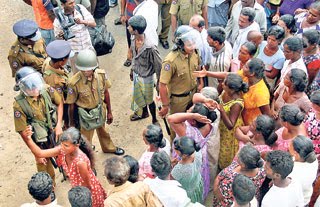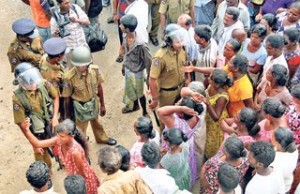The Parliamentary Select Committee’s rejection of the Supreme Court’s decision that the impeachment proceedings against the Chief Justice should be postponed until the Supreme Court determines the constitutionality of the Standing Order 78A that purportedly governs such proceedings, as requested by the Court of Appeal, undoubtedly is the latest breach against the judicial authority in Sri Lanka by the political authority.
The decision of the Supreme Court was good as a ‘determination’ or ‘order’ although the Deputy Speaker, Chandima Weerakkody, opted to ridicule it by saying a “request or something” to Live at 12 of Swarnawahini yesterday (23 November 2012). The format of the recommendation was like any other court order. It was argued and decided. The carefully worded directive after outlining the legal circumstances said:
“However, at this stage, this Court whilst reiterating that there has to be mutual respect and understanding founded upon the rule of law between Parliament and the Judiciary for the smooth functioning of both the institutions, wishes to recommend to the members of the Select Committee of Parliament that it is prudent to defer the inquiry to be held against the Hon. the Chief Justice until this Court makes its determination on the question of law referred to by the Court of Appeal.”
It is important to underline the importance of what it said about the “mutual respect and understanding founded upon the rule of law between Parliament and the Judiciary for the smooth functioning of both the institutions.” But, the Political Commissars over Diyawanna Oya apparently didn’t want to listen to this sober advice for reasons best known to them. Instead they decided to go ahead with the flawed proceedings. They apparently didn’t even listen to the four members of the opposition. Consensus over the procedure of the PSC perhaps is not their concern.
The Supreme Court decision was given after listening to the Counsels on behalf of the petitioners and the Attorney General, Palitha Fernando, as it commented “who appeared on very short notice.” As the decision quoted, the following was the main question that the Court of Appeal has referred to the Supreme Court:
“It is mandatory under Article 107 (3) of the Constitution for the Parliament to provide for matters relating to the forum before which the allegations are to be proved, the mode of proof, the burden of proof, the standard of proof etc. of any alleged misbehavior or incapacity in addition to the matters relating to the investigation of the alleged misbehavior or incapacity?”
It is obvious that the above important question or questions would not have been referred to the Supreme Court unless there had been serious doubts about the Constitutionality of the Standing Order 78A that purportedly governs the proceedings of the impeachment. The following questions naturally come to my mind, as a result of the above and other reasons, even without a proper legal background as a concerned citizen as to the consistency between the Standing Order 78A and the Constitution and particularly its Article 107.
- Is the PSC the correct Forum before which allegations against a Judge of the Supreme Court (including the Chief Justice) or the Court Appeal (including the President) are to be investigated and proved?
- Why the Stating Order 78A from paragraphs 1 to 9 is completely silent on the mode of proof and the standard of proof? Can the PSC be considered a proper legal Forum?
- Why the Standing Order 78A is completely silent on any prior investigating procedure into any allegations of Judicial Officers?
- More importantly, who has the burden of proof? The PSC or the accused Judge?
Anyone who goes through the scantily drafted nine paragraphs of the so-called Standing Order would come to the conclusion – if the person is unbiased and concerned about natural justice – that the procedure of the impeachment is terribly flawed and the fate of the present Chief Justice should not be place under this Kangaroo Court. The following is what the Standing Order says about anything closer to the ‘burden of proof’ in paragraph (5). On all other matters except the question one the Standing Order is completely silent.
“The Judge whose alleged misbehaviour or incapacity is the subject of the investigation by a Select Committee appointed under paragraph (2) of this Order shall have the right to appear before it and to be heard by, such Committee, in person or by representative and to adduce evidence, oral or documentary, in disproof of the allegations made against him.”
Now the accused, in the present case the Chief Justice, “shall have the right to appear before it and to be heard by such Committee, in person or by representative.” This may appear great or sufficient to some because she is given a hearing! Then she can “adduce evidence, oral or documentary.” For what, “in disproof of the allegations made against him!”
Now she is not a ‘He.’ Let alone the gender bias in the language, the Chief Justice has to disprove the allegations! This is travesty of natural justice and people like Anura Priyadarshana Yapa, Nimal Siripala de Silva and Dilan Perera should be ashamed to sit in this Kangaroo Court, not to speak of others.
The Supreme Court also has given very obligingly the reasons why it requests the PSC to kindly postpone the proceedings. As it said, “In terms of Rule 64 (1) of the Supreme Court Rules of 1978 certain procedural steps have to be followed before a determination is made by this Court.” It has also been noted that a decision could be given within two months. This is completely ignored by the PSC. The decision also noted the following more substantially.
“According to the pleadings filed in the Court of Appeal and the submissions made by all learned counsel in this Court, standing order 78(A) of the Parliament contravenes Article 4(c) read with Article 3 , Article 12(1) and 13(5) of the Constitution and are also contrary to the accepted norms relating to the burden of proof.”
The observed points of inconsistency with the Constitution above are mainly four: (1) Article 4 (c) (2) Article 3 (3) Article 12 (1) and (4) Article 13 (5). This is in addition to the Article 107 of the Constitution which governs the overall impeachment procedure. The observation shows the absurdity and the arbitrary nature of the PSC procedure. It is also important to quote what it also said in terms of rule of law and justice in trying to persuade the PSC or the Speaker on the importance of postponing the impeachment proceedings.
“The desirability and paramount importance of acceding to the suggestions made by this Court would be based on mutual respect and trust and as something essential for the safe guarding of the rule of law and the interest of all persons concerned and ensuring that justice is not only be done but is manifestly and undoubtedly seem to be done.”
Unfortunately all these good advices were completely ignored and proceedings went ahead yesterday morning at the Parliamentary complex. It appears that the Political Commissars in the Parliamentary Select Committee seem to think that they are ABOVE THE LAW. They are badly mistaken. The Standing Orders are not law but only rules of procedure. When the Supreme Court decides to hear the objections based on 9 petitions, on Constitutionality and natural justice, by all decency or good sense the PSC proceedings should have been postponed. But it is not to be the case under the present political administration.
What a tragedy of justice if the ‘Chief Justice’ has to prove her innocence before a Political Tribunal hastily convened with inaccurately drafted 14 charges for nothing but political reasons? How can one easily disprove allegations if those are framed and false? What are the implications on rule of law and the system of justice if the so-called Representative of the People (MPs) so behave? These questions speak volumes of the tragedy of Sri Lanka’s democracy under the Rajapaksa rule.
– SLG

